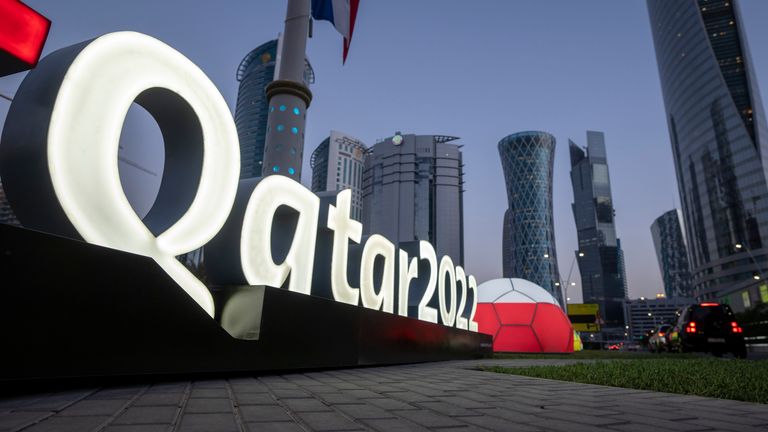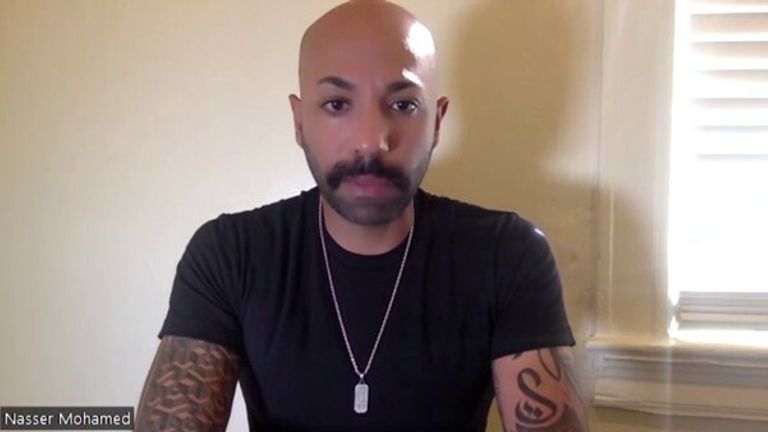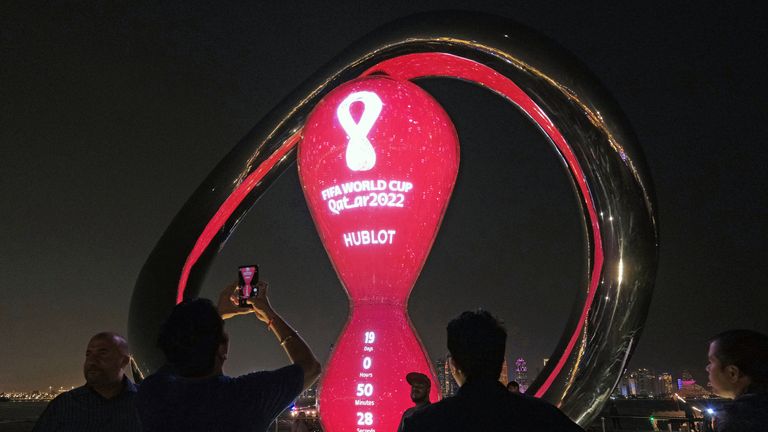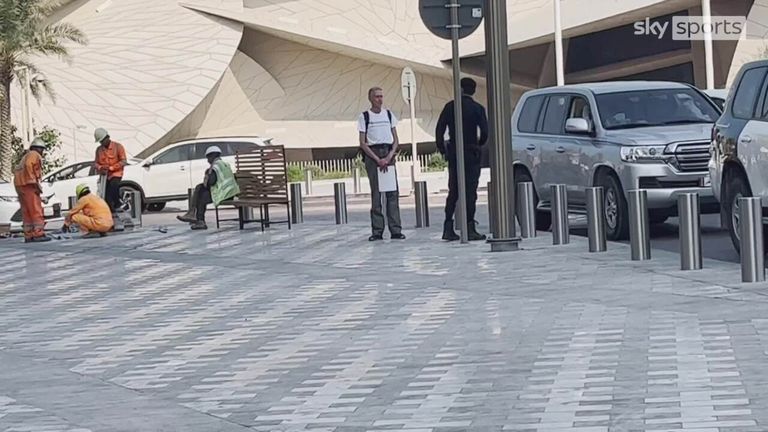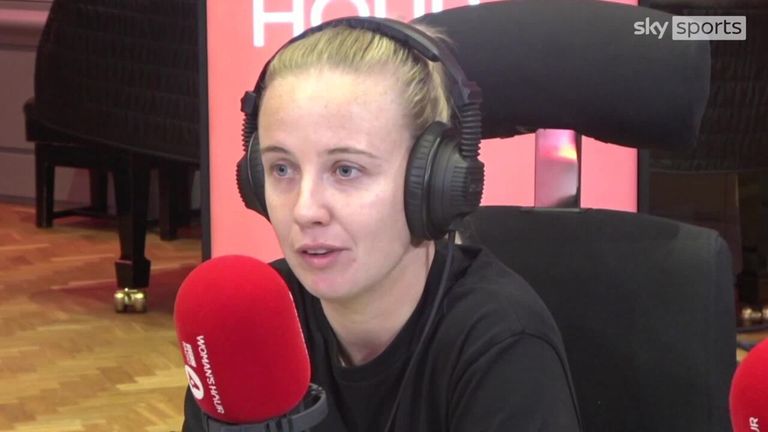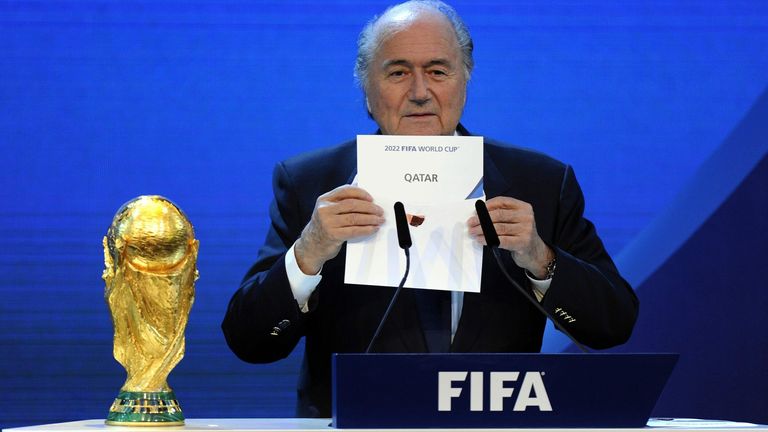Qatar official says homosexuality is 'damage in the mind' before World Cup kicks off
Comments come after Sepp Blatter admitted decision to award the World Cup to Qatar was 'a mistake'; tournament kicks off on November 20; with growing concerns over human rights record and LGBTQ+ treatment
Monday 16 January 2023 12:39, UK
An ambassador for the World Cup in Qatar has described homosexuality as "a damage in the mind" in an interview with German broadcaster ZDF.
The comments come merely two weeks before the World Cup kicks off in the Gulf state and raises further concerns over human rights and LGBTQ+ treatment in the country.
Former Qatari international Khalid Salman told a German reporter: [Homosexuality] is haram. You know what haram [forbidden] means?
"During the World Cup, many things will come here to the country. Let's talk about gays: the most important thing is everybody will accept that they come here - but they will have to accept our rules."
Homosexuality is illegal in Qatar under Islamic Sharia law.
Excerpts of the television interview were shown on Monday, while the full interview, which is part of a documentary, will be shown this Tuesday on ZDF.
- Blatter admits Qatar World Cup decision was a 'mistake'
- The doctor discovering Qatar's 'dark' side
- UK football police unclear how Qatar will treat supporters at WC
Germany interior minister Nancy Faeser condemned Salman's remarks on Tuesday: "Of course, such comments are terrible, and that is the reason why we are working on things in Qatar to hopefully improve."
About 1.2 million international visitors are expected in Qatar for the tournament, which has faced criticism and scepticism ever since the gas-rich state was selected as host by FIFA in December 2010.
- Qatar evicts thousands of foreign workers from Doha ahead of WC
- 'Tone-deaf' foreign secretary criticised for telling LGBT fans to 'respect' Qatar
The interview was cut short by a media officer from the World Cup organising committee after Salman expressed his views on homosexuals, ZDF reported.
Faeser, who is also responsible for sports, said the country's prime minister had given her a safety guarantee for fans, no matter where they came from, whom they love and what they believe in, when she visited Qatar a week ago.
Faeser claims there has been no change to that stance from the prime minister, who is also Qatar's interior minister, and plans to attend Germany's opening World Cup match against Japan in person.
Last month, Germany's ambassador to the Gulf state was summoned by the Qatar government after Faeser appeared to criticise the country for its human rights record.
In Washington, State Department spokesperson Ned Price called the remarks by the Qatari official a great concern: "We have a relationship with Qatar that allows us to discuss our areas of mutual interest, but it also allows us to discuss what is important with the United States and values of tolerance, diversity, of respecting all people regardless of who they are or whom they love. I suspect we'll be addressing that directly."
- Members of Qatar's LGBTQ+ community detained and abused last month - report
- England and Wales FAs ignore FIFA's plea to 'focus on football' in Qatar
FIFA's general position remains that it is are confident all necessary measures will be in place for LGBTQ+ fans to enjoy the tournament in a welcoming and safe environment.
FIFA has also pointed to a number of measures implemented in Qatar, including human rights training sessions and in-stadium anti-discrimination monitoring systems.
'It's like a survival of the fittest situation'
Dr Nas Mohamed, the only publicly out LGBTQ+ Qatari, who has been taking asylum in the United States for the last 11 years, has told Sky Sports News how he had to keep his sexuality secret when growing up in Qatar.
"I had to absolutely keep that part of me completely hidden because it was very dangerous," he said. "Besides social rejection, risk of not being able to hold a job or violence from community members, you also run the risk of being really severely harmed by your own family and law enforcement if this information is out.
"A lot of these stories, including mine, remain in the shadows and a lot of people don't hear about them. Even when you leave and take asylum like myself, we're still afraid to come out publicly and speak because we still worry about being harmed. That's why, even until now, I'm the only one speaking inside or outside of Qatar.
"A lot of us over there really don't know about each other because it's unsafe and when one person is found out the law enforcement punishes them and then taps into their entire network. They go in, go through your contracts and try to find all the other LGBT people you know."
Dr Mohamed also revealed the impact of the LGBT community being hunted in Qatar.
"The Human Rights Watch report that came out recently talked about the preventative security department and how they're basically kidnapping and torturing people in solitary confinement for their sexual orientation and gender identity," he said.
"They would bring the same person more than once to this facility, beat them up and subject them to conversion practices. Then they would offer some of them safety in exchange for working for them as undercover agents. Some people do that because they're trapped.
"Now there's this situation where you're scared of your own community there because you don't know who's working with the law enforcement. You don't know who would get caught and get your information leaked. It's like a survival of the fittest situation and it's just terrible.
"We don't have freedom of speech. We cannot do that without losing everything we have. After this year we have to have a way to continue to bring visibility to what's happening inside Qatar."
Blatter admits Qatar World Cup decision was a 'mistake'
Sepp Blatter has admitted the decision to award the World Cup to Qatar when he was FIFA president was a "mistake".
The build-up to this year's World Cup has been dogged by concerns about the suffering of low-paid migrant workers to build the infrastructure in the tiny Gulf nation and discriminatory laws that criminalise same-sex relations.
Blatter, 86, was the boss of FIFA in 2010 when its executive committee controversially voted for the World Cup to be held in Russia and Qatar in 2018 and 2022 respectively. Blatter claims he did not vote for Qatar and instead wanted a "gesture of peace" by hosting the two tournaments in Russia and then the USA.
- FIFA tells teams to 'focus on football not politics'
- World Cup 2022 schedule, teams and draw
- World Cup latest | Team guides
"The choice of Qatar was a mistake," Blatter said in an interview with Swiss newspaper Tages-Anzeiger, his first since being cleared of fraud charges in July following a £1.7m payment to the former UEFA president Michel Platini.
"At the time, we actually agreed in the executive committee that Russia should get the 2018 World Cup and the USA that of 2022. It would have been a gesture of peace if the two long-standing political opponents had hosted the World Cup one after the other.
"It's too small a country. Football and the World Cup are too big for that."
The Qatar World Cup, which had to be moved to November and December due to heat, is now just two weeks away and Blatter accepts he is responsible for the tournament taking place there.
"I can only repeat: the award to Qatar was a mistake, and I was responsible for that as president at the time," he said.
